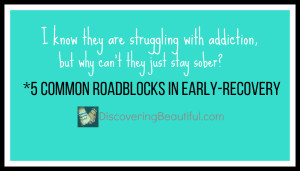
You know that saying “Nothing worth having comes easy?”
When it comes to being a newly sober person this couldn’t be more true.
A person who is has become chemically dependent on a substance has a tough road ahead when it comes to long-term sobriety. They will need a strong support system behind them.
Here are 5 common road blocks people come face to face with on their quest for living a sober life:
1.) The initial battle with the clock.
Why do they tell us to live one day at a time?
Mostly because when you are detoxing or trying to stay sober, one hour can drag on so long,
to us it feels like a week.
Our body is screaming at all times with zero breaks, it is asking for more.
Sometimes people give into the immense pressure.
In the very beginning stages of sobriety we are fighting like hell. You might not be able to see it, but it’s happening.
We are doing our best to figure out what to do with our feelings, our emotions, the physical triggers, and quieting the psychological triggers without any substances.
It’s like an insane bundle of hot mess, squished inside of a physical body,
a body that is watching the second-hand make its way around all of the numbers, in slow motion.
We can hear it move, we feel it move, and it is moving very slow.
So time can feel like public enemy number one when you’re newly sober.
2.) The fear is overwhelming.
We are afraid that we won’t be able to make it and what that could mean.
We are afraid that we have screwed up way too many times.
There is a real fear of the future, fear of failure, and fear of the unknown.
Fear of letting people down.
Fear of having to face the past.
Fear of having to face all of these people who are rooting for us, after we let them down…again.
Fear of not being strong enough.
Fear of not knowing what to do next.
We are afraid because we don’t have any idea how we are going to face all of it.
We are used to living fast and have become accustomed to instant gratification.
We ended up trading quality of life for a now, now, now way of living.
Most of us assume that positive change will happen as fast as our lives fell apart.Unfortunately, this is not the case and frankly, we start to lose any hope that we might have found when things don’t start to look as pretty as we would like, as fast as we would like.And although change occurs the second that we make the choice to change our lives,
we don’t have the luxury of feeling or seeing any of the changes instantly. So we immediately think that sobriety isn’t working or isn’t for us.Sometimes it can seem easier to revert back to believing that we just aren’t capable,
rather than continuing the hardest, longest, walk of our lives.
4.) Our mistakes loop continuously in our stream of subconscious thoughts.
It might take us years to gain proper perspective to see the damage that we have really caused while we were living the way that we were living,
but don’t assume that we don’t know that we have made a long list of mistakes and have hurt a lot of people.
We know.
This is a huge part of the reason that we keep using when it doesn’t make sense to other people.
We can feel the shame deep in our bones.
Many times, we stay sober just long enough to be reminded of how shitty we are or have been, and all of the harm we have caused, and then, we have heard enough.
Often our emotional baggage and our scars are quieted by drug abuse.
This abuse is what has turned into a this monstrous thing that we are now attempting to gain control of and eradicate. We want to be free of it, and from the pain underneath the surface.We have experienced things that no one should have to go through.
We are forever changed, and rightfully so.We still have not allowed ourselves to process these things that have left imprints on our lives.
Our hearts are tightly bound with bitterness, resentment, sadness, and often, rage.We keep holding onto these feelings because if we let it go, none of it really mattered. If we choose to forgive, it means that we think it was okay. It feels better to keep it with us, because that way our perpetrator is being punished.
Because we have not accepted, faced, and sorted through the damage the aftermath of our experiences will continue to replay in our mind.
In order for healing to begin and for us to make forward progress, we have to make the courageous choice to put this away.
For good.
By trying to understand the hurdles that many people face in early sobriety, I think that we have a clearer understanding of just how tough this road can be for them and we have a better perspective on what our roles as supporters should look like.